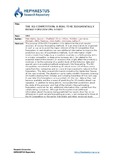| dc.contributor.author | Makridakis, Spyros | |
| dc.contributor.author | Chatfield, Chris | |
| dc.contributor.author | Hibon, Michele | |
| dc.contributor.author | Lawrence, Michael | |
| dc.contributor.author | Mills, Terence | |
| dc.contributor.author | Ord, Keith | |
| dc.contributor.author | Simmons, LeRoy F. | |
| dc.date.accessioned | 2015-12-07T17:18:12Z | |
| dc.date.available | 2015-12-07T17:18:12Z | |
| dc.date.issued | 1993 | |
| dc.identifier.issn | 0169-2070 | |
| dc.identifier.uri | http://hdl.handle.net/11728/6361 | |
| dc.description.abstract | The purpose of the M2-Competition is to determine the post sample accuracy of various forecasting methods. It is an empirical study organized in such a way as to avoid the major criticism of the M-Competition that forecasters in real situations can use additional information to improve the predictive accuracy of quantitative methods. Such information might involve inside knowledge (e.g. a machine breakdown, a forthcoming strike in a major competitor, a steep price increase, etc.), be related to the expected state of the industry or economy that might affect the product(s) involved, or be the outcome of a careful study of the historical data and special care in procedure/methods employed while forecasting. The M2-Competition consisted of distributing 29 actual series (23 of these series came from four companies and six were of macro economic nature) to five forecasters. The data covered information including the September figures of the year involved. The objective was to make monthly forecasts covering 15 months starting from October and including December of the next year. A year later the forecasters were provided with the new data as they had become available and the process of predicting for 15 months ahead was repeated. In addition to being able to incorporate their predictions about the state of the economy and that of the industry the participating forecasters could ask for any additional information they wanted from the collaborating companies. Although the forecasters had additional information about the series being predicted the results show few or no differences in post-sample forecasting accuracy when compared to those of the M-Competition or the earlier Makridakis and Hibon empirical study. | en_UK |
| dc.language.iso | en | en_UK |
| dc.publisher | Elsevier | en_UK |
| dc.relation.ispartofseries | International Journal of Forecasting;vol. 9 | |
| dc.rights | © 1993 Published by Elsevier B.V. | en_UK |
| dc.rights.uri | http://creativecommons.org/licenses/by-nc-nd/4.0/ | en_UK |
| dc.subject | Time series methods | en_UK |
| dc.subject | Forecast accuracy | en_UK |
| dc.subject | Time series forecasting | en_UK |
| dc.subject | Judgmental forecasting | en_UK |
| dc.subject | Empirical competitions | en_UK |
| dc.subject | M-Competition | en_UK |
| dc.title | The M2-competition: A real-time judgmentally based forecasting study | en_UK |
| dc.type | Article | en_UK |
| dc.doi | 10.1016/0169-2070(93)90044-N | |


